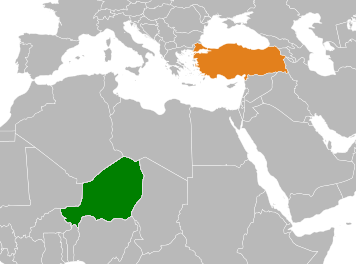
Turkey and Niger have increased their military cooperation since 2020, including through using Libya as a gateway.
“The defense component of the relationship between Niger and Turkey has become more prominent with the signing of a military cooperation agreement in 2020 and the sale of armed drones.”
Summary: Turkey is deploying Syrian militants to Niger to protect economic interests. While their desire for money presents challenges of commitment and resembles Russia’s Wagner mercenaries in West Africa, the Syrian militants operate more like private security contractors and have a lesser counter-insurgency role.
Russia’s Wagner Group, and its successor Africa Corps, have received significant international attention and notoriety because of their operations propping up of post-coup military regimes in West Africa. While their objectives ostensibly include combating Islamist militants and protecting mining and other extractive industries whose exports benefit Russia, they have also partaken in the excessive killing of civilians during counter-insurgency operations.[i] The excerpted French-language article in L’Orient Le Jour highlights Turkey’s recent programs to deploy militants to West Africa, whose activities can be juxtaposed against those of Wagner and Africa Corps.
According to the article, the program involves hundreds of pro-Turkish Syrians—and not Turks themselves—from the Sultan Murad brigade.[ii] This differs from Russia’s Wagner and Africa Corps, whose members are primarily Russians, despite recent evidence of an African member in Wagner ranks in Ukraine.[iii] The Syrians have been contracted by a Turkish private military company, which has paid the Syrian fighters up to $1,500 per month. This is almost ten times more than they had received when fighting in Turkish-controlled areas of Syria. Like with Wagner and Africa Corps members, remuneration is, therefore, a primary incentive for the Syrians to travel to Niger.
The exact activities of these Turkish mercenaries remain unclear. On one hand, the article asserts that their main role is to protect Turkish interests and projects in Niger, including mining operations. In this sense, they would be functioning much like private security contractors, rather than mercenaries. On the other hand, one of the Syrian contractors interviewed for the article noted that the outfit was deployed to combat Boko Haram. If true, this would likely mean that they were based in southeastern Niger near Lake Chad, where iron ore and other minerals are mined, where Boko Haram factions have pillaged villages and even taken over military outposts in the last few years. If this were the outfit’s primary role, it would appear to function more closely to Wagner, though without the regime protection efforts.
Although the interviewee states that his cohorts arrived in Niger only around one year ago, the article claims Turkey had been preparing for their deployment by sending Syrian fighters to train in Libya for several years. This provided the fighters with combat experience in Africa and a gateway for further travel to Niger. In addition, in 2020, Turkey signed a military cooperation agreement with Niger, which involved the sale of armed drones from Turkey to Niger. However, this may have since evolved into the additional deployment of these pro-Turkish Syrians to Niger as well.
The article does not indicate the Syrians in Niger will play as significant of a counter-insurgency role as Wagner or Africa Corps in West Africa, which also means their presence in the country is less likely to generate international concerns on humanitarian grounds. However, the Syrians’ primary motivation of remuneration and the challenging security environment in Niger, including with Boko Haram and other al-Qaeda and Islamic State-affiliated fighters in their midst, raises questions about their ability to successfully defend Turkish interests, let alone enhance security in the region. Another question lingers about whether friction will develop between Turkey and Russia in West Africa through their deployment of fighters to protect their respective interests in similar areas.
Sources:
“Le Niger, nouvel Eldorado des mercenaires proturcs de Syrie (Niger, the new Eldorado of pro-Turkish mercenaries from Syria),” www.lorientlejour.com (Lebanon-based French-language publication covering Francophone international affairs, including coverage of Islamist militancy) 3 May 2024. https://www.lorientlejour.com/article/1413977/le-niger-nouvel-eldorado-des-mercenaires-proturcs-de-syrie-enquete.html
A thousand Syrian fighters from areas under Turkish control have left for Niger for a year to protect Turkish interests and projects. In the areas of northern Syria controlled by Turkey, where recruitment into pro-Ankara factions is the main driver, according to Omar, his monthly salary never exceeded $46. “Here in Niger, we are paid $1,500,” added the young man, who supports his mother and brothers and sisters.
At the group’s headquarters, they signed six-month contracts with a private Turkish military consulting company that protects Turkish interests, including mines, in Niger.
The military regime of Niger, as a result of a coup d’état perpetrated on July 26, 2023, has reoriented its foreign policy and denounced military cooperation agreements with France and the United States, while Russia is advancing its interests in this country. For its part, Turkey has increased its influence in Niger over the past decade through humanitarian aid, development and trade. The defense component of the relationship between Niger and Turkey has become more prominent with the signing of a military cooperation agreement in 2020 and the sale of armed drones.
Notes:
[i] For an analysis of Russia’s Africa Corps, please see: (last Zenn OE Watch)
[ii] The Sultan Murad brigade in Syria was comprised primarily of ethnic Turkmen from Syria and specialized in fighting Islamic State (IS) forces, as opposed to forces loyal to Syrian president Bashar al-Assad. The brigade was part of the Jaysh al-Fateh (“Army of Victory”) coalition, which was backed by Saudi Arabia and Turkey and reached its peak in 2015 before suffering from internal factional disputes. See: Fabrice Balanche, “The Battle of Aleppo Is the Center of the Syrian Chessboard,” WINEP, 5 February 2016.
https://www.washingtoninstitute.org/policy-analysis/battle-aleppo-center-syrian-chessboard
[iii] See, for example, Jacob Zenn, “Russia’s Africa Corps Appears to Be Recruiting African Militants,” Terrorism Monitor, July 9, 2024, https://jamestown.org/program/brief-russias-africa-corps-appears-to-be-recruiting-african-militants/
Image Information:
Image: Turkey and Niger have increased their military cooperation since 2020, including through using Libya as a gateway.
Source: Saotura, https://commons.wikim edia.org/wiki/File:Niger_Turkey_Locator.png
Attribution: CC x 2.0
